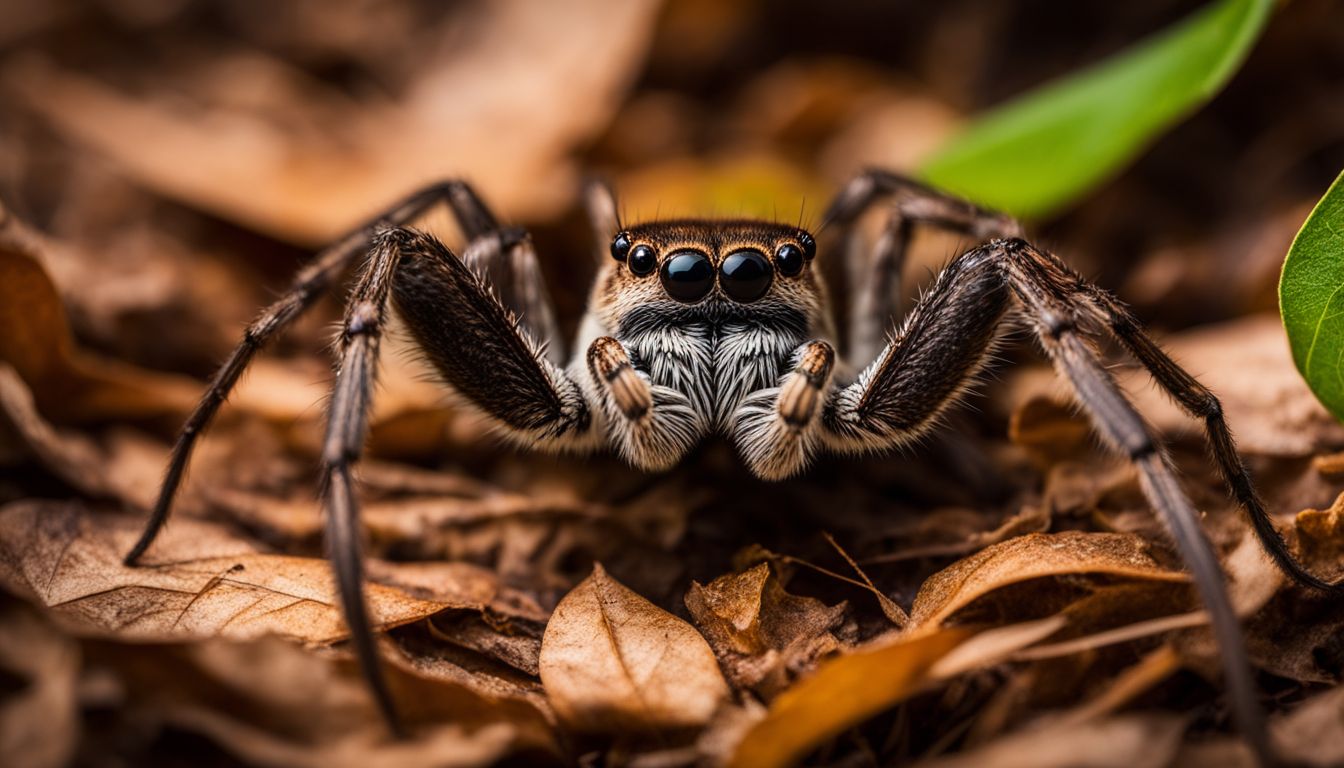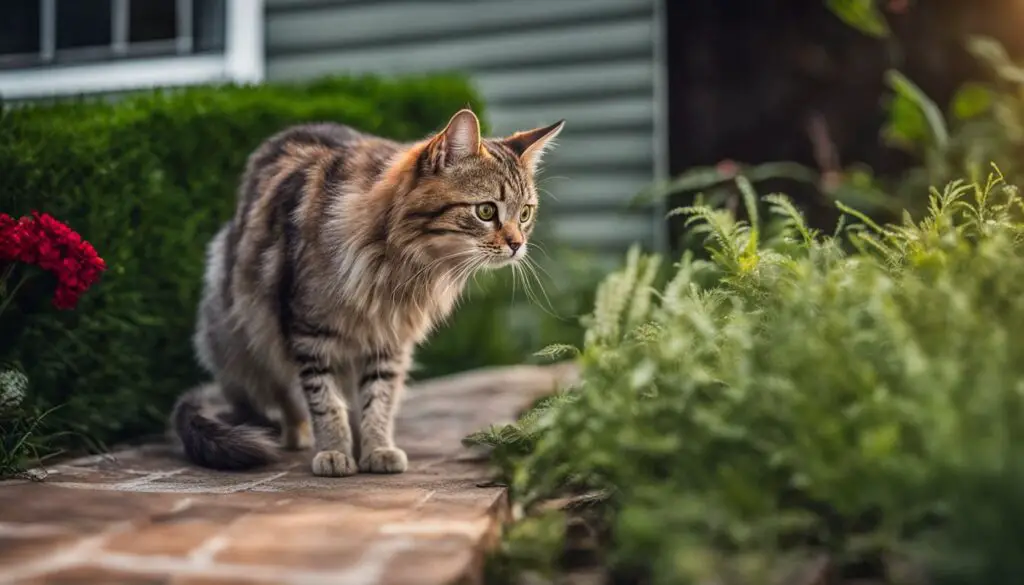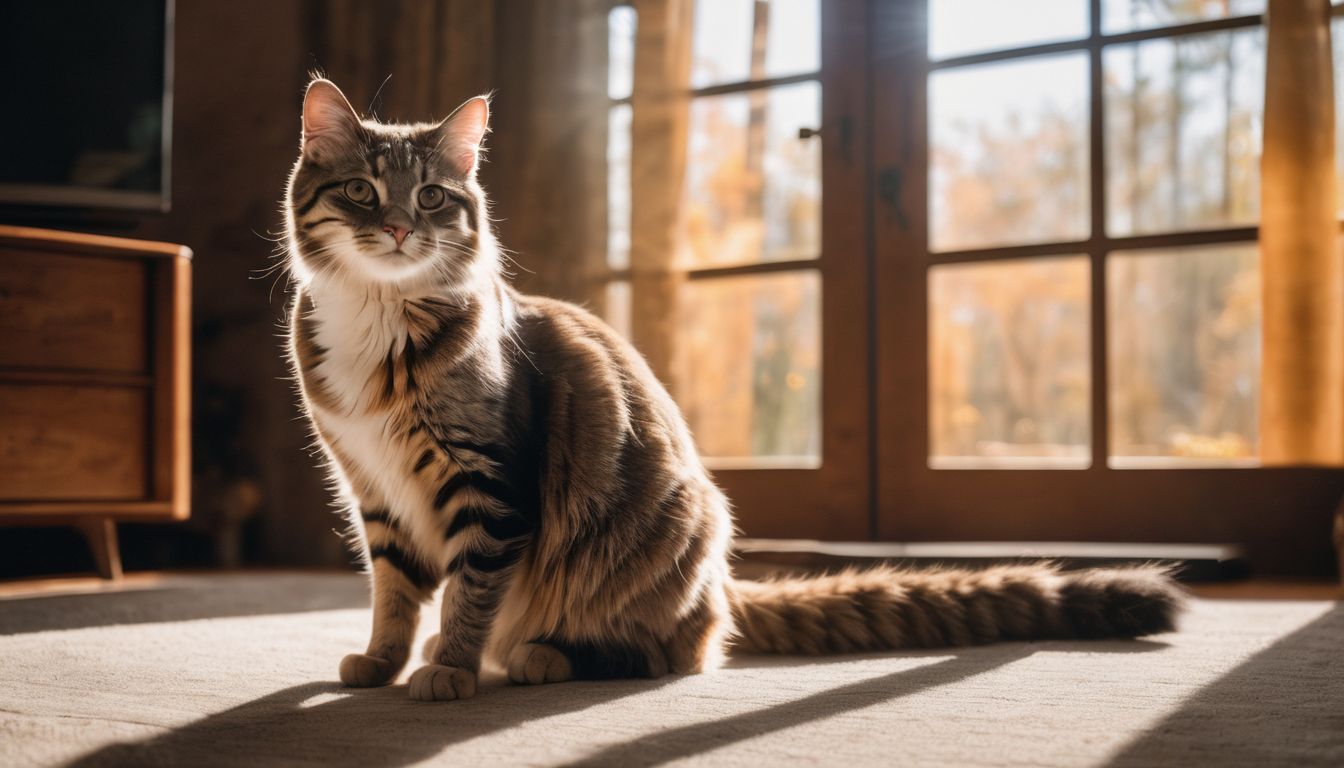Pet owners often worry about the dangers lurking in their cat’s environment. Did you know that wolf spiders, while venomous, are usually not lethal to cats? This article will dive into what makes these eight-legged creatures a concern and how you can protect your feline friends from any potential harm.
Let’s unravel the mystery together!
Key Takeaways
- Wolf spiders are venomous but not lethal to cats, with their bites causing mild swelling and pain.
- Cats can be more vulnerable to the effects of wolf spider venom due to their small size, often experiencing symptoms like redness, swelling, vomiting, and lethargy.
- Prevention measures such as keeping a clean home, sealing entry points for spiders, and promptly seeking veterinary care if a bite occurs can help protect cats from potential harm by wolf spiders.
Wolf Spiders: Identification and Behavior

Wolf spiders are typically brown, gray, or black in color and can range from 1/2 to 2 inches in length. They are known for their fast movements and prefer to live in dark, sheltered areas like under rocks or logs.
Physical Characteristics of Wolf Spiders
Wolf spiders are easy to spot with their unique looks. They have big eyes and a tough, bulky body that sets them apart from other spiders.
- Size: They can grow pretty large, with some being as big as an inch and a half.
- Color: Most of them are brown or gray, which helps them blend in with the ground and leaves.
- Eyes: They have eight eyes arranged in three rows. The bottom row has four small eyes, the middle row has two very big ones, and the top row has two medium-sized ones.
- Legs: Their legs are long and strong, giving them speed to chase down bugs.
- Hair: Their bodies and legs often have hair on them. This hair is not just for looks; it helps them feel movements around them.
Habits and Habitats of Wolf Spiders
After learning about their looks, it’s interesting to see how wolf spiders live and behave. They make their homes on the ground, often hiding in leaf piles or small holes. You might spot them in your yard since they like outdoor spaces a lot.
These spiders are experts at catching food. They do not wait for prey to come into webs because they don’t make them! Instead, wolf spiders run after insects at night, using their strong venom to turn bugs into mush before eating them up.
Wolf spiders really like being alone and staying away from people whenever they can. Even though they could bite if you touch them, they’d rather run off and be by themselves. Their bites hurt but aren’t deadly like some other spider bites can be.
Many times, these eight-legged hunters will move right into lawns where it’s easy for them to find things to eat lying around on the ground.
The Venom of Wolf Spiders: A Threat to Cats?

Toxicity of Wolf Spider Venom
Wolf spider venom is not deadly to people. But when cats get bitten, it’s a big deal. Their small bodies make them more likely to get sick from the poison. The bite might hurt like a bee sting and can be worse for pets than humans.
You won’t see most people getting sick from wolf spider bites, but cats are different.
If your pet does get bitten by one of these spiders, watch out! They could feel really bad and even die if you don’t help them fast. It’s key to know what signs mean your cat needs a vet after dealing with wolf spiders.
– Comparison with More Dangerous Spiders
Comparison with More Dangerous Spiders
Understanding the relative danger wolf spiders pose to cats requires a comparison with more venomous spider species. When comparing wolf spider venom to that of more hazardous spiders, it is crucial to consider the toxicity levels and potential reactions in cats.
| Spider Type | Venom Toxicity to Cats | Common Reactions in Cats | Geographical Presence |
|---|---|---|---|
| Wolf Spider | Low toxicity | Mild swelling, pain | Worldwide |
| Black Widow | High toxicity | Severe pain, muscle cramps, tremors | Primarily in the United States |
| Brown Recluse | Moderate to high toxicity | Necrosis, systemic illness | Central and Southern United States |
Wolf spiders are venomous, not poisonous, which means they inject venom when they bite. Their venom is not lethal to humans and typically does not cause allergic reactions. More dangerous spiders, such as the black widow and brown recluse, present a higher threat level to cats due to their more potent venom. Brown recluse venom can cause serious reactions, indicating the severity when compared to wolf spider bites. After understanding the risks of a wolf spider bite, it’s important to recognize the signs of such an encounter in your cat.
Recognizing a Wolf Spider Bite on Your Cat
Look out for symptoms such as redness, swelling, and pain at the bite site, as well as restlessness or agitation in your cat. If you notice these signs, it’s important to seek veterinary care immediately.
Symptoms of a Wolf Spider Bite in Cats
Symptoms of a Wolf Spider Bite in Cats:
- Painful swelling, redness, and itching at the bite site.
- Vomiting, diarrhea, and muscle pain or cramping.
- Lethargy, fever, and loss of appetite.
- Rapid breathing and muscle rigidity.
- Tremors, agitation, and bleeding at the bite site.
When to Seek Veterinary Care
If you notice your cat displaying symptoms such as swelling, redness, or pain at the bite site, it’s essential to seek veterinary care promptly. Additionally, if your cat experiences symptoms like vomiting, drooling, rapid breathing, or seizures after a suspected spider bite, immediate veterinary attention is crucial.
Remember that early treatment can help prevent potential complications from spider bites and ensure your cat’s well-being.
Prevention: Keeping Your Cat Safe from Wolf Spiders
To keep your cat safe from wolf spiders, it’s important to reduce spider encounters by keeping your home clean and free of clutter. Additionally, safely remove any wolf spiders found in your home to prevent potential bites on your curious feline friend.
Tips to Reduce Spider Encounters
- Regularly vacuum your floors and clean your home to remove potential hiding spots for wolf spiders. This helps prevent them from entering your home and reduces the chances of encounters.
- Remove clutter such as piles of clothes, newspapers, and cardboard boxes where wolf spiders may hide. Keeping a tidy home reduces their nesting opportunities.
- Seal cracks and gaps in doors, windows, and walls using caulk or weather stripping to block the entry points for wolf spiders. This helps keep them outside where they belong.
- Place screens on windows and doors to prevent wolf spiders from slipping inside your home through openings.
- Keep outdoor lights off as much as possible or use yellow sodium vapor lights instead of white lights, as the latter can attract insects that are prey for wolf spiders.
- Trim back vegetation and bushes near your home since tall grasses and shrubs can attract insects favored by wolf spiders.
Safe Removal of Wolf Spiders from Your Home
To safely remove wolf spiders from your home, follow these steps:
- Use a glass jar and a piece of stiff paper or cardboard to catch and release the spider without harming it. This is a simple and effective method that reduces the risk of bites.
- Seal any cracks, crevices, or gaps in walls, windows, and doors to prevent wolf spiders from entering your home. Eliminating entry points reduces encounters with these spiders.
- Reduce outdoor lighting near entryways as it attracts insects that are prey for wolf spiders. Less light means fewer prey and consequently fewer spiders.
- Keep your home clean and clutter – free to reduce hiding places for wolf spiders. Regularly vacuuming and dusting helps to control their population indoors.
- Consider using natural pest control methods such as diatomaceous earth to manage insect populations without resorting to chemical pesticides harmful to pets.
Conclusion: Balancing Caution and Understanding
In conclusion, wolf spiders are not particularly poisonous to cats. While their venom can cause discomfort and a nasty welt, it is generally not dangerously harmful to cats. However, it’s important to be cautious as smaller pets like cats can be more vulnerable to the effects of the venom.
By taking steps to reduce encounters with wolf spiders and seeking prompt veterinary care if a bite occurs, you can help keep your feline friends safe. Remember that prevention and awareness are key in keeping our pets healthy and happy around these eight-legged critters.
Discover more about the fascinating world of spiders and their dietary habits, such as whether spiders eat stink bugs, by clicking here.
FAQs
1. Can a wolf spider bite be harmful to my cat?
Wolf spiders are not poisonous to cats, but if they bite, it could cause a small sore or swelling.
2. Are there other spiders that could hurt my cat?
Yes, some spiders like the brown recluse and the black widow are very poisonous. If these spiders bite your cat, they can make them very sick or even more serious problems.
3. What should I do if a spider bites my cat?
If you think a spider bit your cat, especially if it might be from a brown recluse or black widow, take them to the vet right away for help.
4. How can I tell which kind of spider bit my cat?
Spider identification can be hard but look out for insect bites that turn into an ulcer or make your pet act sick with nausea; this might mean it was a dangerous one like the brown recluse spider.
5. What will happen to my cat after getting bitten by a poisonous spider?
Bites from poisonous spiders like brown recluses may lead to sore spots that get worse over time and could cause cell death around the wound without quick treatment; black widow bites may give cats things like muscle pain and hives.




